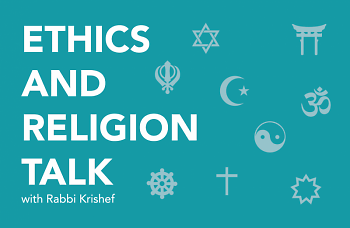Janet asks, “I see many faith-based groups focus on restricting abortions and addressing the women in the cases of unwanted pregnancies. But I see none of these groups addressing the problem of men not taking responsibility -- and not providing a safe and supportive space for women to thrive with the children they both have created. What does your tradition say about this?”
My response:
I see in this question a gratuitous attempt to denigrate those traditions who take strong positions against abortion, and I say this as one who believes both that women should have access to abortion and that abortion should only be used to protect the physical and mental health of the mother.
My tradition teaches that every parent is responsible for educating their children, teaching them what is holy about the Jewish way of life, teaching them about the blessings of family, and how to take responsibility and provide for oneself and one’s family. These are the responsibilities of every father and every mother.
Father Kevin Niehoff, O.P., a Dominican priest who serves as Judicial Vicar, Diocese of Grand Rapids, responds:
“This complex question is difficult to answer briefly. The Catholic Church teaches that human beings are created in the image and likeness of God. Therefore, all human beings are worthy of dignity befitting a child of God!
“The Catholic Church may not directly address the problem of men not taking responsibility for the children they help bring into being. But these men have the moral responsibility to care for the life they helped to create! I like to believe that those who do not take responsibility for their children will have to face Saint Peter with their response to that question when they are born into eternal life.
"The question implies that the men not taking responsibility are not husbands but instead and using the modern colloquial phrase, ‘baby daddies.’ A new can of worms is open as the Catholic Church teaches that all sexual relations outside of the context of marriage are sinful. The fruit of that action is not sinful… the ACT is sinful. Men… you MUST respect and therefore take responsibility for the life you create, whether you are married or not!”
Fred Stella, the Pracharak (Outreach Minister) for the West Michigan Hindu Temple, responds:
“While there is nothing explicit in our scriptures, to the best of my knowledge, that directly addresses this issue, there is an overarching understanding permeating Hinduism that insists on devotees committing to their dharma, or duties. I believe that throughout most of human history, when a pregnancy occurs men have been able to move on with their lives much too easily, escaping this most important duty. I agree with the reader’s estimation that we are not living up to our ideals. It is because of this imbalance of responsibility, among other things, that most Hindus in the United States support a woman’s reproductive autonomy.”
Father Michael Nasser, who writes from an Eastern Christian perspective and is Pastor of St. Nicholas Orthodox Christian Church, responds:
“It’s true that most of the attention on this issue of abortion tends to center on a woman’s right to choose what to do with the child conceived in her womb, but this questioner rightly points out the importance of seeing the shared responsibility of both parents for the new life that both participate in creating. The term ‘procreation’ relates this importance of seeing the act of a man and woman continuing the creation begun by God Himself. As both are equally necessary in the creation of new life, both are divinely responsible for the proper care of this new life.”
The Reverend Colleen Squires, minister at All Souls Community Church of West Michigan, a Unitarian Universalist Congregation, responds:
“Unitarian Universalism strongly supports a woman’s right to choose all her reproductive health decisions. We believe all health decisions should be made between patient and their health care professional. We also believe in comprehensive sexual education particularly for our youth. It is a proven fact that high quality and accurate sexual education lowers unwanted pregnancies. In our curriculum we teach all youth and young adults of their responsibilities if they choose to become sexually active.”
Rev. Ray Lanning, a retired minister of the Reformed Presbyterian Church of North America, responds:
“Many of our churches sponsor the work of the Pregnancy Resource Center of Grand Rapids (tel. 616.319.2301) in order to provide the kind of practical support you advocate, for both men and women. Public debate on abortion tends to be ensnared in politics and preoccupied with legalities. Laws cannot save lives or reform society. Political action is no substitute for the ministry of mercy. Our model should be the good Samaritan (Luke 10:25-37). The Samaritan is commended because he responded to human need, at personal cost, and in a thoroughly practical way.”
This column answers questions of Ethics and Religion by submitting them to a multi-faith panel of spiritual leaders in the Grand Rapids area. We’d love to hear about the ordinary ethical questions that come up in the course of your day as well as any questions of religion that you’ve wondered about. Tell us how you resolved an ethical dilemma and see how members of the Ethics and Religion Talk panel would have handled the same situation. Please send your questions to [email protected].
The Rapidian, a program of the 501(c)3 nonprofit Community Media Center, relies on the community’s support to help cover the cost of training reporters and publishing content.
We need your help.
If each of our readers and content creators who values this community platform help support its creation and maintenance, The Rapidian can continue to educate and facilitate a conversation around issues for years to come.
Please support The Rapidian and make a contribution today.
